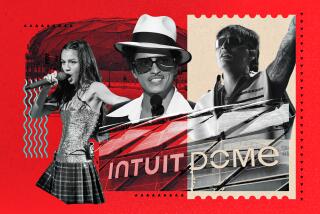House of Blues Nightclub Aims to Be a Net Club
- Share via
House of Blues’ flagship nightclub, a three-story corrugated metal shack on the Sunset Strip, sold out about 60% of its shows this year as fans rushed to see acts from Kenny Wayne Shepherd to No Doubt.
Fans who couldn’t score tickets or make it to Los Angeles for the shows were out of luck. But what if they could pay to watch the concerts live on their computers? Would they?
In the answer lies the future for the privately held company, which hasn’t posted a profit in seven years in the nightclub-restaurant business and was rocked by a round of boardroom turbulence that resulted in the ouster of its founder in 1997.
As theme restaurants such as Planet Hollywood sink, Los Angeles-based House of Blues is seeking to reshape itself in part as a “dot-com” company, hoping fans will flock to pay-per-view broadcasts of its concerts and its archive of taped performances.
The private investors who control the company--and who made it the nation’s No. 2 concert venue owner this summer by acquiring Seagram Co.’s 20 amphitheaters for $190 million--expect House of Blues to go public in six months or so. If it does, the hype surrounding music sales on the Web may help it secure a sky-high stock valuation. But analysts are divided about whether the concept will yield a real-world profit.
For House of Blues, the stakes are enormous. Its core business, the chain of seven clubs, posted a net loss on $90 million in revenue last year, though it reported positive cash flow for the first time. And Seagram’s concert unit, while well-regarded, is in a traditionally thin-margin business, earning about $15 million on $200 million in revenue last year.
Record Labels Could Present Hurdles
A stock sale would trigger a payoff for the owners, which include venture capital firms Chase Capital, J.H. Whitney & Co. and Silver Ventures, and help finance the chain’s ambitious expansion plans. Executives want to see 30 more House of Blues clubs and at least four new amphitheaters pop up nationwide in the next five years.
House of Blues Chief Executive Greg Trojan, who joined the chain in 1996 after a two-year stint as the CEO of California Pizza Kitchen, said profit in the clubs and amphitheaters will rise as it attracts corporate sponsors. Trojan also said he would cut costs by making future House of Blues clubs smaller and more efficient.
Its plan to roll out the new venues comes as the $1.3-billion concert industry is rapidly consolidating. New York-based SFX Entertainment has been on an 18-month, $1.1-billion buying spree snatching up promoters, sports management agencies and 110 mid-size and large venues. Some of the remaining independent promoters have lined up with House of Blues to try to compete for national tours.
Both SFX and House of Blues believe that control of a national network of venues raises the potential of attracting corporate sponsors and a much higher level of advertising support.
With more venues, House of Blues also hopes to corral major acts that would, in turn, deliver music fans to its Web site and other media properties. Company representatives say they hope the major record conglomerates embrace House of Blues as a sort of marketing bazaar, with the ability to cross-promote acts nationally in its clubs, syndicated radio show and in-house record label.
While consumer demand for pay-per-view concert Web-casts is virtually nonexistent today, the company projects that in five years, half its profit will come from sales over the Internet. Particularly as more households reach the Internet via broadband lines (allowing for clearer video and audio feeds), House of Blues executives believe more people will tune in to live broadcasts and its archive of stored concerts.
“There’s no reason for me to think that’s not going to happen,” said Lou Mann, a veteran Capitol Records executive who was hired to run House of Blues’ media properties. “I want to be positioned not only as a brand but as the live-music destination of the Internet.”
House of Blues might face a series of hurdles from major record conglomerates, which are fiercely protective of their copyrights and remain leery of online distribution.
To broadcast a live concert, House of Blues usually needs only an artist’s permission. But in order to archive the event for later re-broadcast, the firm must win an OK from the artist’s label. Mann said the firm has permission to re-air only about 200 of the more than 2,000 concerts it has recorded.
In fact, the record conglomerates plan to broadcast live concerts themselves. Atlantic Records, for example, has built a studio at its New York headquarters exclusively for online concerts and other events featured on its own Web site. Sony, whose Manhattan studio complex is used by numerous labels, has wired the facility for Internet broadcasting.
“I think people are going to be very, very hesitant to sign rights away,” said one label executive. “The question is can they turn themselves into the place to go before the labels do [Web-casting] themselves.”
House of Blues executives hope to improve their chances of securing rights by negotiating revenue-sharing deals with the record labels. But that hinges on House of Blues’ ability to drive enough traffic to its Web site to generate significant revenue. For the moment, the firm allows fans to download live tracks and view streaming video from its concert archive for free. But it envisions charging a monthly subscription fee.
Demand Low for TV’s Pay-Per-View Concerts
On Web broadcasts, the firm charges $4.99--but only for the two highest-quality feeds. Because high-speed broadband lines reach so few households, demand for those feeds so far has been anemic. A recent broadcast of a Ziggy Marley concert drew only 40 paid customers.
Analysts also note the history of television pay-per-view concerts is not encouraging. TV pay-per-view musical events are typically money-losers and draw little interest compared with boxing and wrestling. (An estimated 750,000 households purchased pay-per-view concerts on cable and satellite TV last year--about half of what September’s De La Hoya-Trinidad fight drew in one night.)
Network executives say production and marketing costs for most concerts far outstrip the revenue brought in by the audiences, which are often made up of small clusters of an act’s most loyal fans.
Only two to four concerts per year can draw the sort of fanatical audiences needed to generate significant profit.
But Trojan said House of Blues’ production costs will be so much lower than television’s that some Web broadcasts will break even with only “a few hundred” buyers.
Analysts offer mixed views on the potential.
“I quite frankly can’t imagine a huge business in Web-casting,” said Mark Hardie, an analyst at Forrester Research. “There may be pockets of fans interested in any one concert, but those pockets may not amount to enough to pay the freight.”
Others, including Paul Kagan & Associates analyst Jae Kim, foresee an exploding market for online concert pay-per-views that will yield $250 million in worldwide revenue in five years. House of Blues said its own projections are even more optimistic.
Success Depends on Culture Shift
If the concept works, it will largely validate the vision of the company’s founder, Isaac Tigrett, who was ousted from the boardroom two years ago amid directors’ complaints about the chain’s financial performance.
Tigrett, who also had co-founded the Hard Rock Cafe chain, opened the first House of Blues in Cambridge, Mass., in 1992, and developed one of the first live music broadcasts on the Internet in 1995.
But Tigrett poured millions of dollars into promotion of the brand name, including a hastily built temporary blues club for the 1996 Olympic Games in Atlanta. The venue proved a hit but resulted in a net loss to the company of more than $7 million.
In retrospect, Tigrett said, “I probably got too many venture capitalists on my board. They were insistent that this wasn’t an entertainment company. [But] the original vision was correct.”
House of Blues isn’t alone in its belief in that vision, and its Web site is one of a growing number that offer live broadcasts, archived concerts, music videos and interviews, or CD and merchandise sales.
Tigrett’s first restaurant chain, Hard Rock, is touring acts through its network of 40 U.S. restaurants and broadcasting concerts periodically. SFX plans to launch its Internet initiative in earnest next year, with online ticket sales and concert broadcasts.
Tunes.com has built its own studio and broadcasts from venues in Chicago and elsewhere. Digital Club Network has recruited more than 35 small clubs, including New York punk temple CBGB, to allow Web broadcasts as part of its effort to build a library of early recordings of what might be tomorrow’s hottest bands.
At House of Blues, media properties chief Mann awaits a shift in consumer culture.
“We’ve got to let the consumer get used to watching concerts on the Internet,” he said. “They’re not used to it yet. You put a popular band on there, people will come. There’s not a label guy in the world that’s not going to want to do this with us.”
More to Read
Inside the business of entertainment
The Wide Shot brings you news, analysis and insights on everything from streaming wars to production — and what it all means for the future.
You may occasionally receive promotional content from the Los Angeles Times.










